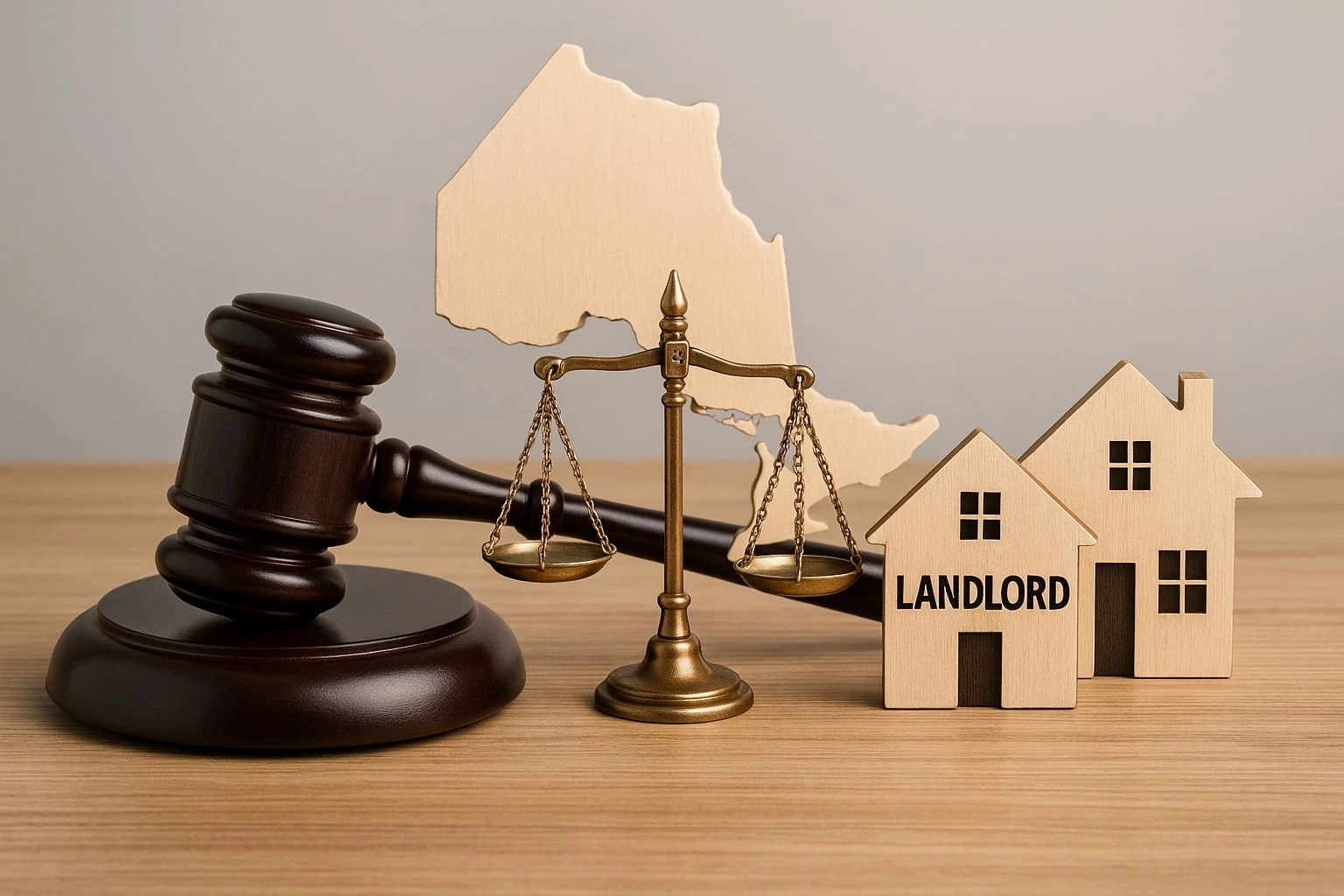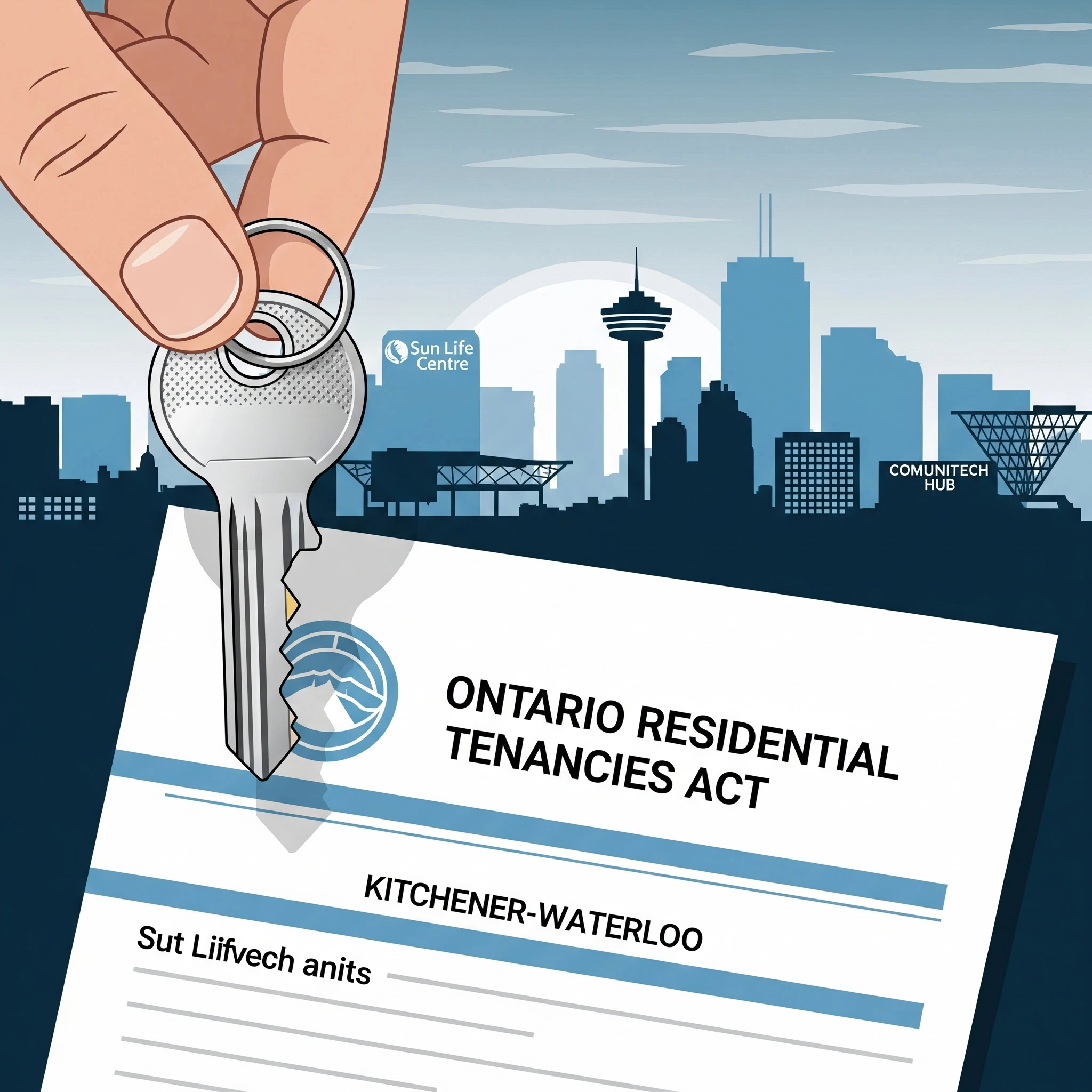In Kitchener-Waterloo, understanding the landlord-tenant laws is really essential for both parties. The Residential Tenancies Act (RTA) sets out clear rights and responsibilities, ensuring tenants enjoy a safe living space. For example, landlords must provide written notice for evictions and cannot act without the Landlord and Tenant Board’s (LTB) approval. It’s also important to know that tenants can contest eviction orders and seek legal help if necessary. Rent increase guidelines are established too, currently set at 2.1% for 2026, which landlords must follow unless there’s an exception. Knowing these rules helps everyone have a smoother renting experience in the area.
Table of Contents
- Legal Framework of Ontario Landlord Tenant Laws
- Understanding Tenant Rights in Kitchener-Waterloo
- The Eviction Process Explained
- Rent Increase Rules and Guidelines
- Property Standards for Rental Units
- Community Supports for Tenants
- Resources Available for Tenants
- Key Contacts for Landlord-Tenant Issues
- Frequently Asked Questions
Legal Framework of Ontario Landlord Tenant Laws
The legal framework for landlord-tenant relationships in Ontario is primarily governed by the Residential Tenancies Act (RTA). This act defines the rights and responsibilities of both landlords and tenants, ensuring that both parties are informed of their obligations. For instance, landlords are required to provide tenants with a written lease agreement that includes essential terms, fostering clarity from the start of the rental relationship. Additionally, the RTA outlines specific guidelines regarding notice periods for rent increases and evictions, which are crucial for maintaining fairness in housing practices.
Tenants are granted various rights under the RTA, including the right to a safe and well-maintained living environment. Landlords must respect tenants’ privacy, providing 24 hours notice before entering the rental unit. This emphasizes the importance of personal space in rental agreements. Furthermore, the RTA prohibits discrimination based on race, gender, religion, and other factors, reinforcing the principle of equality in housing.
For resolving disputes, the RTA establishes procedures through the Landlord and Tenant Board (LTB). This board serves as a platform for tenants and landlords to present their cases, particularly in eviction scenarios. It is essential for tenants to understand that evictions cannot occur without an official order from the LTB, ensuring that their rights are protected. Moreover, tenants can request timely repairs for maintenance issues, with the expectation that landlords will address these concerns responsibly.
Financial matters are also clearly defined in the RTA, including provisions for security deposits, which cannot exceed one month’s rent. Landlords must ensure their properties adhere to health and safety standards as mandated by municipal laws, promoting safe living conditions for tenants. Overall, the RTA provides a comprehensive legal framework that supports a balanced and fair relationship between landlords and tenants in Ontario.
Understanding Tenant Rights in Kitchener-Waterloo
Tenants in Kitchener-Waterloo have several important rights that protect them within their rental situations. First and foremost, they have the right to live in a safe and habitable home. This means that the rental unit must be free from hazards, such as mold or structural issues, that could endanger their health or safety. Additionally, tenants have the right to refuse entry to their unit unless the landlord provides proper notice, typically 24 hours in advance, except in emergencies.
Tenants also have the right to organize and join tenant unions or associations, which can provide support and advocacy for issues affecting their living conditions. If a tenant faces an unreasonable rent increase, they can challenge it by applying to the Landlord and Tenant Board (LTB), which helps ensure that rent hikes are fair and justified. Furthermore, tenants can request rent receipts from their landlords for tax purposes or to keep accurate records of payments.
It is crucial for tenants to know that they cannot be retaliated against for exercising their rights. For example, if a tenant reports maintenance issues, the landlord cannot take adverse actions, such as eviction, in response. Tenants are also entitled to a written lease that clearly states all terms of the rental agreement, ensuring transparency in their living arrangements.
For those who may struggle to afford legal representation, tenants have the option to apply for legal aid, providing them access to necessary support. They also have the right to use their rental unit for lawful purposes without interference from the landlord. Keeping thorough records of all communications with landlords can be invaluable in supporting any claims or disputes that might arise.
- Tenants have the right to live in a safe and habitable home, free from hazards.
- Tenants can refuse entry to their unit unless proper notice is given by the landlord.
- Tenants have the right to organize and join tenant unions or associations.
- Tenants can challenge unreasonable rent increases by applying to the LTB.
- Tenants may request rent receipts from landlords for tax purposes or record keeping.
- Tenants cannot be retaliated against for exercising their rights, such as reporting maintenance issues.
- Tenants have the right to a written lease that clearly states all terms of the rental agreement.
- Tenants can apply for legal aid if they cannot afford legal representation.
The Eviction Process Explained
In Ontario, the eviction process starts with the landlord needing a valid reason to evict a tenant. Common reasons include non-payment of rent or breaking lease terms. Landlords must provide written notice, detailing the reason for eviction, and the notice period varies depending on the reason, typically ranging from 10 to 120 days. It’s crucial that landlords use the correct forms provided by the Landlord and Tenant Board (LTB).
Once the notice period expires, if the tenant has not vacated the property, the landlord must file an application with the LTB and attend a hearing. During this hearing, tenants have the right to contest the eviction. They can present their evidence and testimony, making it essential for tenants to be prepared and informed about their rights. The LTB will evaluate both sides before making a decision.
If the LTB approves the eviction, it does not happen immediately. If the tenant does not leave voluntarily, a sheriff may be involved to carry out the eviction. In some situations, if a tenant is evicted, they might be eligible for compensation, especially if the eviction is related to renovations or personal use of the unit.
Tenants should never hesitate to seek legal advice immediately upon receiving an eviction notice. Understanding their options and rights can significantly impact the outcome of their situation. If they believe the LTB’s decision is unjust, they can appeal to a higher court. Navigating the eviction process can be complex, but being informed helps both landlords and tenants manage their rights and responsibilities.
Rent Increase Rules and Guidelines
In Ontario, landlords must provide written notice to tenants at least 90 days before any rent increase takes effect. This is crucial for ensuring that tenants have enough time to prepare. The province sets an annual rent increase guideline, which caps the maximum allowable increase for most residential units. For example, the guideline for 2026 is 2.1%. However, landlords can sometimes exceed this guideline if they have made significant improvements to the property, but they must provide a valid reason for doing so. Additionally, landlords are not allowed to increase rent more than once within a 12-month period without approval from the Landlord and Tenant Board (LTB).
Tenants also have rights when it comes to rent increases. If they experience maintenance issues or if the landlord fails to meet property standards, tenants can apply to the LTB for a rent decrease. Tenants can request a copy of the rent increase guideline from their landlord to stay informed. If tenants feel that the increase is unjust, they can negotiate with their landlord before the notice period expires. Keeping detailed records of rent payments and any communication regarding rent increases is advisable for tenants, as this documentation can be helpful if disputes arise.
| Rule Description | Requirement/Details |
|---|---|
| Written Notice of Rent Increase | Landlords must give tenants a written notice of rent increase at least 90 days before the increase takes effect. |
| Annual Rent Increase Guideline | The rent increase guideline is set annually by the province, setting a maximum allowable rent increase for most units. |
| Exceptions to Guideline | Exceptions may apply if the landlord has made significant improvements to the property. |
| Limit on Increases | Landlords cannot increase rent more than once within a 12-month period without LTB approval. |
| Tenant’s Right to Decrease | Tenants may apply to the LTB for a rent decrease due to maintenance issues or if the landlord fails to meet property standards. |
| Right to Receive Guidelines | Tenants have the right to receive a copy of the rent increase guideline from their landlord upon request. |
| Reason for Exceeding Guideline | Landlords must provide a reason for any rent increase that exceeds the annual guideline. |
| Negotiation of Increases | Tenants can negotiate rent increases with their landlords before the notice period expires. |
| LTB Resources | The LTB has resources available for tenants to understand their rights regarding rent increases. |
| Record Keeping | Tenants should keep records of their rent payments and any correspondence regarding increases. |
Property Standards for Rental Units
Municipal property standards bylaws in Kitchener-Waterloo establish the minimum maintenance and safety requirements for rental units. Landlords must ensure their properties comply with health and safety codes enforced by the municipality. If tenants find that their rental unit does not meet these standards, like having inadequate heating, plumbing issues, or problems with electricity, they can file complaints with local authorities. Additionally, tenants have the right to a clean unit free from pests and mold, as mandated by health regulations.
When tenants report repair requests, landlords are expected to respond promptly, typically within a reasonable timeframe. If a tenant feels their unit is unsafe, they can request an inspection from the municipality, which may result in local authorities conducting regular checks to ensure compliance with property standards. If landlords fail to meet these standards, they could face fines or orders to complete necessary repairs. It’s crucial for tenants to document any breaches of property standards and communicate these issues in writing to their landlords to ensure a record is kept.
Community Supports for Tenants
In Kitchener-Waterloo, tenants facing housing challenges have access to a variety of community supports designed to help them navigate their situations. Local organizations play a crucial role in providing resources and assistance. For instance, Waterloo Region Community Legal Services offers free legal advice, ensuring that tenants understand their rights and can seek help when needed. Lutherwood Housing Support provides essential services for individuals experiencing housing issues, focusing on stability and support.
The Social Development Centre Waterloo Region is dedicated to preventing evictions and offers resources that can help tenants maintain their housing. Additionally, The Working Centre conducts workshops aimed at empowering tenants, helping them gain a clearer understanding of their rights and responsibilities in the rental process.
Emergency assistance is also available through local charities, which may provide tenants with funds to cover urgent rent or utility bills. Community centers often host outreach programs to educate renters about their rights and available resources. Tenant support groups can facilitate discussions and provide peer support for those facing eviction or disputes, fostering a sense of community and shared experience.
Housing advocates in the area are available to assist tenants in navigating the often complex legal processes related to housing, making it easier to address grievances or disputes with landlords. Furthermore, numerous online resources and workshops are offered, ensuring that tenants have the tools they need to advocate for themselves and understand their legal standing.
Resources Available for Tenants
Tenants in Kitchener-Waterloo have several resources to assist them in understanding their rights and resolving disputes. The Landlord and Tenant Board (LTB) is the primary tribunal for addressing rental issues, providing a platform for tenants to resolve disputes with landlords. For those who prefer to avoid formal hearings, mediation services are also available to facilitate amicable resolutions. Community legal clinics play a crucial role by offering free legal advice tailored to housing matters, ensuring tenants have access to necessary information. Additionally, online resources, including the LTB website, provide valuable insights into forms and processes that tenants may need. Local libraries can serve as another useful resource, often housing information on tenant rights and landlord responsibilities. For urgent concerns, hotlines are available to offer immediate advice. Various community organizations host workshops that educate tenants about their rights, while support groups enable tenants to connect and share experiences. Eligible tenants may also seek assistance from legal aid services for representation at the LTB. Furthermore, educational materials online can help tenants navigate the eviction process and better understand their rights.
Key Contacts for Landlord-Tenant Issues
If you face any challenges as a tenant in Kitchener-Waterloo, there are several key contacts that can help you navigate your situation. The Landlord and Tenant Board (LTB) is a primary resource for resolving disputes; you can reach them for questions related to your rights and responsibilities at LTB Contact. For support specifically geared towards tenants, the Waterloo Region Community Legal Services (WRCLS) offers free or low-cost legal advice, which can be invaluable for understanding your options. Their website is accessible at WRCLS. Additionally, Lutherwood Housing Support provides important assistance for those encountering housing issues. More information can be found at Lutherwood. Local municipal offices can also be a helpful resource for information on property standards and tenant rights. Community centers often have directories of available support services, and legal aid clinics can assist those in need of representation. Engaging with local housing advocates can further guide you through the rental market. Online forums and local government websites may also offer resources and insights, making it easier for you to find the help you need.
Frequently Asked Questions
What rights do tenants have in Kitchener-Waterloo?
Tenants in Kitchener-Waterloo have rights like living in a safe environment, having privacy, and being protected from unfair eviction. They should receive proper notice before any changes or issues arise.
Can a landlord enter my apartment without permission?
No, a landlord cannot enter your apartment without permission, except in emergencies. They are required to give you notice, usually 24 hours in advance, for regular visits.
What should I do if my landlord is not making repairs?
If your landlord is not making necessary repairs, you can first talk to them directly. If that doesn’t work, you may file a complaint with the Landlord and Tenant Board or seek advice from tenant organizations.
How much notice does a landlord need to give for eviction?
A landlord must give different amounts of notice depending on the reason for eviction, but generally, it’s at least 60 days for most cases, unless it’s for non-payment of rent, which can be shorter.
What happens if a tenant breaks a lease in Kitchener-Waterloo?
If a tenant breaks a lease, they might have to pay penalties or cover the rent until a new tenant is found. It’s important to read the lease carefully and check local laws for specific rules.


